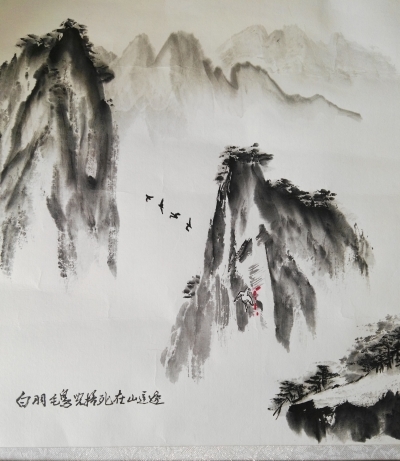During Beijing’s September 3rd military parade, Xi Jinping and Vladimir Putin discussed immortality and organ transplants, shocking the public. (Screenshot from NTD video)
[People News] For this year’s Beijing military parade, Xi Jinping’s original wishful plan was, first, to show off military “muscles” to the whole world, especially to the absent Western countries; second, to declare that his power remained stable. Unexpectedly, an “accidental” leak event not only shattered Xi Jinping’s dream but also plunged him into a public opinion storm about an “organ transplant” scandal. So, was this really an accident, or did someone deliberately make it happen?
Before the September 3rd parade officially began, on the road where Xi Jinping, Putin, and Kim Jong-un walked together toward Tiananmen Gate, they chatted enthusiastically, seemingly unaware that media were recording audio.
Xi Jinping’s interpreter said in Russian: “In the past, people over 70 years old were rare; nowadays people say that 70 years old is still just a child.”
Then followed a section of Putin’s speech that was not clearly audible, after which his Chinese interpreter supplemented: “With the development of biotechnology, human organs can be continuously transplanted, living younger and younger, even becoming immortal.”
Subsequently, Xi Jinping could be heard responding: “Some people predict, in this century, people might be able to live to 150 years.”
This conversation between Xi and Putin was captured by the public broadcast signal provided by CCTV to overseas media, instantly shocking the world and quickly sparking a public opinion frenzy.
The UK’s Guardian said: This was an extremely unusual 'private conversation' that was captured. The Sun described the discussion about life extension as a “bloody moment.” The Independent’s commentary column pointed out that, although the conversation was absurd, it was logical: the desire of those in power for immortality is never surprising.
Italian-based writer Li Ying shared a submission from a netizen on Platform X, stating that on the day of the 9/3 parade, the number “150” saw a surge in search volume on WeChat, with the total index skyrocketing 9,650.24% compared to the previous day, reaching 3,368,513 searches. But it was immediately censored.
It is said that Xi Jinping, because of this matter, received severe criticism from Party elders. In his fury, Reuters received a lawyer’s letter from CCTV, formally requesting them to delete the video and revoke the legal license to use the video. Having no choice, Reuters removed the video on September 5 and issued “delete” orders to more than 1,000 media clients.
Although Reuters deleted the video, in a statement, it insisted its report was accurate, and that withdrawing the videos was because it no longer held the rights to publish that segment.
The Sun also criticised that the CCP authorities demanded that the media delete related clips and pull the footage from international media channels, showing a deliberate operation of “rapid control after controversial content exposure.”
So, was this internationally sensational “leak” truly an accident, or did someone deliberately want the whole world to hear it?
The self-media “Inside Reference” revealed in a program that it was people close to Xi Jinping who, dissatisfied with him, did this.
How exactly did the teams responsible for on-site audio recording and video editing operate at that time?
According to “Inside Reference,” in the CCTV broadcast truck, some were responsible for switching images, others for monitoring different camera angles. So during live broadcast, if they heard Xi and Putin talking about sensitive topics like “organ transplantation,” “immortality,” the staff could control how much delay the broadcast had, and when to cut it off.
“Inside Reference” believed they deliberately broadcast the Xi-Putin conversation to the entire world. Many around Xi are dissatisfied with him. The CCP high officials’ practice of using others’ organs to extend life is intolerable to many within the system. So those with a sense of justice stood up. The opposition forces inside the system deliberately exposed these scandals under the guise of a “work error.” This was a form of soft resistance. A single “work mistake” allowed everyone to recognise the image of the “devil.”
So, what “devilish details” were actually hidden in the Xi-Putin conversation?
When “150” became a hot search word in mainland China, many netizens shared photos of big-character posters from 1966, mocking: “The source of Xi Jinping’s great dream has been found.”
Zhu Yunhe, a researcher of modern Chinese history, reposted this “good news” on Platform X and shared a passage from the afterword of Gao Hua’s How the Red Sun Rose: The Origins of the Yan’an Rectification Movement, which also mentioned a similar big-character poster:
“In early 1967, I saw a big-character poster titled ‘Great News’ on the wall of the South-North Goods Store on Changjiang Road near my home. It boldly stated that Marshal Ye Jianying, in a recent speech, said our great leader was in excellent health, and doctors said Chairman Mao could live to 150 years old. When I saw this poster, my mind boomed. Although I had some doubts, my intuition at the time was that my whole life was destined to be spent in Mao Zedong’s era.”
Mao Zedong did not live to 150, but the “981 Project for Leaders’ Health” at the PLA 301 Hospital is still striving for this goal.
In September 2019, an advertisement spread wildly on WeChat in mainland China. The ad introduced a medical service at PLA 301 Hospital, set up specifically for the highest CCP leadership, aiming to extend CCP officials’ lives to 150 years. After sparking controversy, it was quickly censored by authorities.
Xi Jinping, born in 1953, grew up in Mao Zedong’s era and was certainly not unfamiliar with the big-character poster saying Mao could live to 150. “The dream that Chairman Mao did not fulfil, let me, Chairman Xi, fulfil.” This is also another tribute from Xi Jinping, often seen as reviving the Cultural Revolution and following Mao’s old path, to Mao Zedong.
But can Xi Jinping really live to 150 through organ transplants?
James Markmann, chairman of the executive committee of the American Society of Transplant Surgeons and a renowned transplant expert, told Fox News: “There is no scientific evidence that humans can live to 150 through transplants.”
The Australian reported that scientists were highly sceptical, believing the idea of extending life through continuous organ replacement is medically unrealistic, involving serious risks such as organ rejection, chronic inflammation, and immunosuppression.
The claim of “unrealistic” is, of course, reasoning based on normal thinking. But for Xi Jinping and these CCP officials, the situation is different.
Some medical experts explained: A crucial part of organ transplantation is matching organs, and the key to matching is genetic locus compatibility. “Perfect matches” in transplantation are extremely rare, with a probability of less than one in a thousand between unrelated donors and recipients. But Xi Jinping theoretically has a donor pool of more than a billion people, and the privilege and bloody industry chain to kidnap any living person who matches his genetic loci to harvest organs for surgery.
Republican Congressman Chris Smith recently pointed out that this conversation once again reminded the U.S. to accelerate legislation banning organ transplant tourism to China. House Speaker Mike Johnson said that if leaders publicly discuss such topics, it shows their attitude toward organ harvesting is alarming, and related bills should be prioritised for review.
Mike Johnson told NTD reporters: “We have heard many horrifying Chinese organ transplant stories, and these organs come from ‘unwilling donors’—which is already an understatement!”
Nina Shea, director of the Centre for Religious Freedom at the Hudson Institute in Washington, told The Dajiyuan that this incident unintentionally revealed the truth of the CCP’s live organ harvesting. She said: “The unguarded conversation between these two tyrants makes us even more worried that they are creating a real-life sci-fi dystopian world by forcibly harvesting organs from those they see as political enemies.”
A mainland netizen lamented on Douyin that if Xi Jinping really lived to 150, it would truly be “an endless hell”!
Live organ harvesting has always been a truth that the CCP has tried to conceal at all costs. Once exposed, it directly shakes the CCP’s ruling foundation.
Former Canadian MP David Kilgour and human rights lawyer David Matas’s independent investigation already pointed out that during 2000–2005, about 41,500 organ transplants in China had unidentified sources, highly likely from Falun Gong practitioners whose organs were forcibly harvested. The report drew conclusions based on indirect evidence such as short wait times, organ supply chains, website ads, and “organs available on demand.”
An independent tribunal led by the UK ruled that “the persecution is real,” concluding that the CCP’s live organ harvesting of Falun Gong and Uyghurs constitutes one of the gravest crimes against humanity of our time, with no evidence that it has stopped.
The Diplomat also reported the testimony of Cheng Peiming, the first known survivor of live organ harvesting. He was sentenced to eight years by the CCP for practising Falun Gong and suffered live organ harvesting: half of his left lung and part of his liver were illegally removed.
The Medical Journal of Australia, Voice of America, and many overseas media published dedicated reports on Cheng Peiming’s identity and testimony.
Currently, the CCP’s evil practice of live organ harvesting has spread across society, affecting everyone around you.
In recent years, large volumes of information on Chinese social media have shown an increasing number of missing people, especially frequent disappearances of teenagers and university students. While expressing outrage, mainland netizens also questioned whether these disappearances were related to live organ harvesting.
Some netizens shared photos showing health examination vans, mobile treatment vans, mobile surgery vans, and mobile cremation vans—meaning physical examination first, then treatment, then surgery, finally cremation—indicating an “assembly line service” for organ harvesting, chilling to the bone.
In Jiangxi, 15-year-old Hu Xinyu was found dead after being missing for over 100 days. It was said to be suicide, but Chinese netizens launched an online investigation, with more than 70% not believing the official explanation. Some analysed the suspicious points of the case, concluding Hu Xinyu was “harvested for organs.”
“Truth Media” once shared on its X account that a former deputy minister of China’s Ministry of Education had received five hearts and two kidneys in 14 years, but where did so many organs come from? He called this “terrifying upon deeper thought.”
Last year, Luo Shuaiyu, a 28-year-old intern doctor in mainland China, exposed live organ harvesting and trafficking at “Xiangya Second Hospital of Central South University.” Soon after, he mysteriously fell from a building near his dormitory at the hospital. Before his fall, Luo Shuaiyu had sent a message to colleagues: “If I don’t show up at work tomorrow, please give the computer files to the disciplinary committee.”
After the family refused to sign the “suicide acknowledgement,” they recovered data from the computer themselves and found a large amount of whistleblowing material on medical corruption, weighing 8 kilograms, totalling 1,119 pages, described as an “encyclopedia of hospital scandals.” Luo’s father once said in a livestream that someone tried to silence them with 15 million yuan.
According to media reports and recordings released by the family, one conversation about “organ sample collection” was shocking. In the recording, Luo Shuaiyu and a department staff member mentioned “taking specimens from children, six male and six female, organs preserved in the laboratory,” and repeatedly said chilling things like “if the money doesn’t arrive, just cut it” and “whether he survives depends on fate.”
It is said that Luo Shuaiyu’s computer files contained 217 suspected cases of illegal removal of healthy organs, covering the liver, gallbladder, intestines, and more.
(First published by People News) △











News magazine bootstrap themes!
I like this themes, fast loading and look profesional
Thank you Carlos!
You're welcome!
Please support me with give positive rating!
Yes Sure!